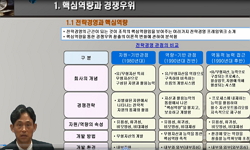본 연구는 지식경영에 관한 의미와 정의를 올바로 분별하고 그 정체성을 재확립하여 오늘날 지식경영의 가치평가에 기여할 수 있는 순기능 제시에 목적을 두었다. 이를 위해 성서적 시각에...
http://chineseinput.net/에서 pinyin(병음)방식으로 중국어를 변환할 수 있습니다.
변환된 중국어를 복사하여 사용하시면 됩니다.
- 中文 을 입력하시려면 zhongwen을 입력하시고 space를누르시면됩니다.
- 北京 을 입력하시려면 beijing을 입력하시고 space를 누르시면 됩니다.
https://www.riss.kr/link?id=A107214006
- 저자
- 발행기관
- 학술지명
- 권호사항
-
발행연도
2020
-
작성언어
Korean
-
주제어
지식 ; 경영 ; 지식경영 ; 지식자산 ; 가치평가 ; 지식공유 ; Knowledge ; Management ; Knowledge Management ; Knowledge Assets ; Creating Value ; Sharing of Knowledge
-
등재정보
KCI등재
-
자료형태
학술저널
-
수록면
27-46(20쪽)
-
KCI 피인용횟수
0
- DOI식별코드
- 제공처
-
0
상세조회 -
0
다운로드
부가정보
국문 초록 (Abstract)
본 연구는 지식경영에 관한 의미와 정의를 올바로 분별하고 그 정체성을 재확립하여 오늘날 지식경영의 가치평가에 기여할 수 있는 순기능 제시에 목적을 두었다. 이를 위해 성서적 시각에서 지식에 관한 신앙적 본질과 기능을 신ᆞ구약으로 각각 구분하여 이로부터 오늘에 되새길 수 있는 함의를 유추하고 그 결과를 지식경영에 관한 본질적 의의에 덧붙여 기독신앙의 관점에서 그 실질을 부각하였다. 그 결과를 요약하면 다음과 같다. 첫째, 지식경영은 기업 구성원의 지식자산을 조직 또는 구성원 간 공유함으로써 제반 경영성과를 극대화하기 위한 경영활동 또는 관리시스템으로 요약할 수 있다. 둘째, 지식경영관리는 구성원이 보유한 지식자산의 가치평가를 포함하여 지식공유에 관한 보상체계 및 적용 등 기업에 내부화된 전사적 인프라에 결부하여 제도화하여야 한다. 셋째, 성서적 시각에서 경영은 하나님과 사람에 대하여 하나님께서 요구하고 계시는 권능과 약속을 상기하는 중에 간절한 마음으로 계획을 세우고 진취적인 자세로 새로운 창조를 위한 의사결정을 이루어 내는 과정으로 특정할 수 있다. 넷째, 지식은 하나님의 소유이자 하나님께 귀속되어있는 선한 능력으로서 하나님과 올바른 관계를 요건에 두고 간절히 구해 얻어야 하며 마음에 간직하고 수시로 묵상하며 또한 지켜가야 할 기독신앙의 정체성, 곧 크리스천의 본질로서 새길 수 있다. 마지막으로 지식경영의 성서적 기조는 크리스천의 지위와 위상을 바로 새겨 하나님과 사람에 대하여 선한 계획을 바로 세워 진취적 자세로 새로운 창조를 위한 의사결정을 이루기 위해 하나님께 귀속된 지식을 선용하기 위한 과정으로 보아 이는 크리스천 기업경영의 수단이자 본질로 바로 새겨야 한다.
다국어 초록 (Multilingual Abstract)
Knowledge management is the systematic management of an organization"s knowledge assets for the purpose of creating value and meeting tactical and strategic requirements; it consists of the initiatives, processes, strategies, and systems that sustain ...
Knowledge management is the systematic management of an organization"s knowledge assets for the purpose of creating value and meeting tactical and strategic requirements; it consists of the initiatives, processes, strategies, and systems that sustain and enhance the storage, assessment, sharing, refinement, and creation of knowledge. Knowledge management efforts typically focus on organisational objectives such as improved performance, competitive advantage, innovation, the sharing of lessons learned, integration and continuous improvement of the organisation. These efforts overlap with organisational learning and may be distinguished from that by a greater focus on the management of knowledge as a strategic asset and on encouraging the sharing of knowledge. Knowledge management is an enabler of organizational learning. In the other hand, in the view point of bible, not only knowledge including perceiving, learning, understanding, willing, performing, and experiencing but knowledge is not to be intellectually informed about some abstract principle, but to apprehend and experience reality. Knowledge is not the possession of information, but rather its exercise or actualization. Thus, biblically to know God is not to know about him in an abstract and impersonal manner, but rather to enter into his plan.
목차 (Table of Contents)
- 요약
- Ⅰ. 머리말
- Ⅱ. 지식경영의 정의와 구현수준
- Ⅲ. 지식경영에 관한 성서적 기조
- Ⅳ. 맺음말
- 요약
- Ⅰ. 머리말
- Ⅱ. 지식경영의 정의와 구현수준
- Ⅲ. 지식경영에 관한 성서적 기조
- Ⅳ. 맺음말
- 참고문헌
- Abstract
참고문헌 (Reference)
1 최무진, "지식경영 교육의 기독교적 접근방법" 한국로고스경영학회 11 (11): 139-160, 2013
2 심종석, "성서적 시각에서 경영의 본질적 의미와 실제" 한국로고스경영학회 18 (18): 117-136, 2020
3 유세준, "글로벌시대의 경영학원론" 법문사 385-386, 2017
4 장경천, "경영학의 이해" 탑북스 2017
5 반병길, "경영학원론 : 현대기업의 이해" 박영사 316-, 2008
6 임창희, "경영학원론" 라온 2019
7 오준환, "경영학원론" 청람 2016
8 신유근, "경영학원론" 다산출판사 47-,
9 김재명, "경영학원론" 박영사 517-, 2001
10 강길환, "경영학원론" 대왕사 2013
1 최무진, "지식경영 교육의 기독교적 접근방법" 한국로고스경영학회 11 (11): 139-160, 2013
2 심종석, "성서적 시각에서 경영의 본질적 의미와 실제" 한국로고스경영학회 18 (18): 117-136, 2020
3 유세준, "글로벌시대의 경영학원론" 법문사 385-386, 2017
4 장경천, "경영학의 이해" 탑북스 2017
5 반병길, "경영학원론 : 현대기업의 이해" 박영사 316-, 2008
6 임창희, "경영학원론" 라온 2019
7 오준환, "경영학원론" 청람 2016
8 신유근, "경영학원론" 다산출판사 47-,
9 김재명, "경영학원론" 박영사 517-, 2001
10 강길환, "경영학원론" 대왕사 2013
11 이필상, "경영학원론" 법문사 2010
12 황복주, "경영학원론" 유원북스 2013
13 Haller, H, "iMapping: a zooming user interface approach for personal and semantic knowledge management" 119-128, 2010
14 McDermott, R., "Why information technology inspired but cannot deliver knowledge management" 41 (41): 103-117, 1999
15 Ruggles, R., "The state of the notion : Knowledge management in practice" 40 (40): 80-89, 1998
16 Buniyamin, N, "The intranet: a platform for knowledge management system based on knowledge mapping" 28 (28): 729-746, 2004
17 Arqawi, S. M., "The impact of obstacles to the application of knowledge management to performance excellence" 2 (2): 32-50, 2018
18 Kaivo-Oja, J, "The effects of the internet of things and big data to organizations and their knowledge management practices" 495-513, 2015
19 Davenport, T. H., "Successful knowledge management projects" 39 (39): 43-57, 1998
20 Ruppel, C. P, "Sharing knowledge through intranets : A study of organizational culture and intranet implementation" 44 (44): 37-52, 2001
21 Huysman, M, "Practices of managing knowledge sharing: towards a second wave of knowledge management" 11 (11): 81-92, 2004
22 Earl, M. J, "Opinion: what is a chief knowledge officer?" 40 (40): 29-, 1999
23 Jones, R., "Measuring the benefits of knowledge management at the Financial Services Authority : a case study" 29 (29): 475-487, 2003
24 Zeleny, M., "Management support systems : towards integrated knowledge management" 7 (7): 59-70, 1987
25 Nemati, H. R., "Knowledge warehouse : an architectural integration of knowledge management, decision support, artificial intelligence and data warehousing" 33 (33): 143-161, 2002
26 Donoghue, L. P., "Knowledge management strategies that create value" 1 (1): 48-53, 1999
27 Coombs, R., "Knowledge management practices and path-dependency in innovation" 27 (27): 239-256, 1998
28 Fangqiu, X., "Knowledge management obstacles relation diagnosis in the process of core competence cultivation" (20) : 43-, 2009
29 Azmi, A. S. M., "Knowledge management obstacles in real estate (valuation) organisations: Towards quality property services" 202 : 159-168, 2015
30 Alavi, M, "Knowledge management and knowledge management systems: Conceptual foundations and research issues" 107-136, 2001
31 Wiig, K. M., "Knowledge management : Where did it come from and where will it go?" 13 (13): 1-14, 1997
32 Quintas, P., "Knowledge management : A strategic agenda" 30 (30): 385-391, 1997
33 Lin, H. F., "Examining the factors influencing knowledge management system adoption and continuance intention" 11 (11): 389-404, 2013
34 Patton, M. Q., "Evaluation, knowledge management, best practices, and high quality lessons learned" 22 (22): 329-336, 2001
35 Preece, A., "Evaluating verification and validation methods in knowledge engineering" 10 (10): 91-104, 2001
36 Landaeta, R. E., "Evaluating benefits and challenges of knowledge transfer across projects" 20 (20): 29-38, 2008
37 Kotnour, T., "Determining the benefit of knowledge management activities" 94-99, 1997
38 Gurteen, D., "Creating a knowledge sharing culture" 2 (2): 1-4, 1999
39 Paraiso, E. C, "An intelligent speech interface for personal assistants applied to knowledge management" 3 (3): 217-230, 2005
40 Zaied, A. N. H., "An integrated knowledge management capabilities framework for assessing organizational performance" 4 (4): 1-10, 2012
41 Nonaka, L., "A theory of organizational knowledge creation" 11 (11): 833-845, 1996
42 Sarkar, S., "A collaborative platform for application knowledge management in software maintenance projects" 1-7, 2008
동일학술지(권/호) 다른 논문
-
- 한국로고스경영학회
- 이갑두(Gab Doo Lee)
- 2020
- KCI등재
-
사도바울의 복음사역에 나타난 변혁적 리더십에 관한 탐색적 연구: 로마서를 중심으로
- 한국로고스경영학회
- 전영수(Young-Soo Jeon)
- 2020
- KCI등재
-
- 한국로고스경영학회
- 황병문(Byungmoon Hwang)
- 2020
- KCI등재
-
- 한국로고스경영학회
- 최경수(Kyong Soo Choi)
- 2020
- KCI등재
분석정보
인용정보 인용지수 설명보기
학술지 이력
| 연월일 | 이력구분 | 이력상세 | 등재구분 |
|---|---|---|---|
| 2022 | 평가예정 | 재인증평가 신청대상 (재인증) | |
| 2019-01-01 | 평가 | 등재학술지 유지 (계속평가) |  |
| 2016-01-01 | 평가 | 등재학술지 유지 (계속평가) |  |
| 2012-01-01 | 평가 | 등재학술지 선정 (등재후보2차) |  |
| 2011-01-01 | 평가 | 등재후보 1차 PASS (등재후보1차) |  |
| 2010-01-01 | 평가 | 등재후보학술지 유지 (등재후보1차) |  |
| 2008-01-01 | 평가 | 등재후보학술지 선정 (신규평가) |  |
학술지 인용정보
| 기준연도 | WOS-KCI 통합IF(2년) | KCIF(2년) | KCIF(3년) |
|---|---|---|---|
| 2016 | 0.45 | 0.45 | 0.53 |
| KCIF(4년) | KCIF(5년) | 중심성지수(3년) | 즉시성지수 |
| 0.62 | 0.65 | 0.566 | 0.31 |




 DBpia
DBpia






